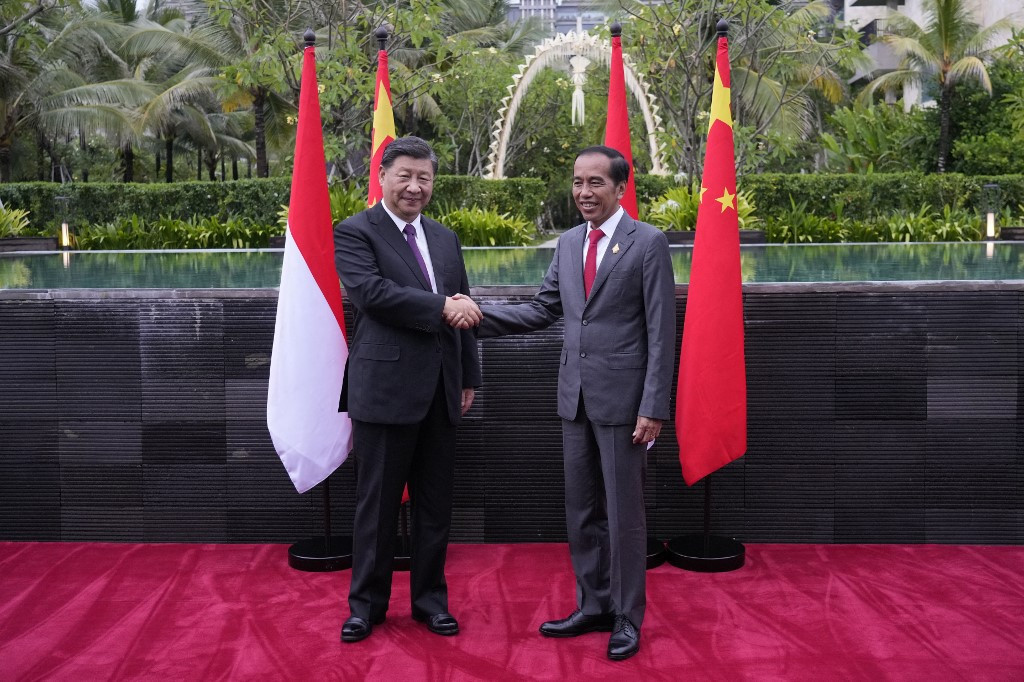Govt showcases Beijing ties as summit ends
Jokowi, Xi pledge to elevate cooperation to higher level.
Change Size


In a bilateral meeting with his Chinese counterpart at the Group of 20 Summit in Bali, President Joko “Jokowi” Widodo highlighted the immense significance Indonesia attributes to its cooperation with Asia’s economic powerhouse.
Appearing for a joint statement with President Xi Jinping on Wednesday evening, at the very end of the two-day G20 Summit held in Nusa Dua, the two sides vowed to “elevate bilateral cooperation to a higher level,” according to a press release issued by China’s foreign ministry the following morning.
Center stage of the announcement was an almost-completed high-speed railway project to vastly cut the time needed to travel between Jakarta and the West Java capital of Bandung. Built by Chinese-Indonesian consortium KCIC, the project has been marred by delays and cost overruns, but that did not stop the two heads of state from hailing it as “a symbol of the strategic cooperation between the two countries”.
Jokowi and Xi “watched the operational trial through video link and a video presentation on the achievements of China-Indonesia cooperation,” read the press release. The event had been scheduled to coincide with Xi’s visit to Indonesia for the G20 Summit, one of the rare occasions for which Xi has traveled abroad since the start of the coronavirus pandemic.
The two watched the new train pull out of Tegalluar Station, which is the endpoint of the line in Bandung regency. But the line is widely expected to be extended all the way to Surabaya in East Java.
Read also: Govt reaffirms Jakarta-Surabaya high speed railway, wants to involve China
China reportedly has its foot in the door for that extension plan, with Coordinating Maritime Affairs and Investment Minister Luhut Pandjaitan telling reporters after an event with the Chinese Chamber of Commerce in Indonesia last month: “If we are already comfortable with [China], then why find a replacement? I think you do not like switching your spouse, either.”
Both sides stressed the need to swiftly finish the project, but various obstacles need to be overcome for its successful completion. The Transportation Ministry's director of railway facilities, Djarot Tri Wardhono told The Jakarta Post on Thursday that "the challenge in this process is human resource readiness."
China also appears keen to jump into the breach left by the withdrawal of major potential financiers like Japan’s Softbank from building Indonesia’s next capital city.
With the government banking on the private sector to fund most of the greenfield megaproject in East Kalimantan, doubts have emerged over the ambitious timeline.
Beijing appears to be prodding its firms to engage: “We will continue to encourage outstanding Chinese companies to […] take part in the development of Indonesia’s new capital and the North Kalimantan Industrial Park, and expand cooperation in the digital economy, green development and other areas,” the statement says.
With its engagement increasing rapidly in recent years, China has become the biggest foreign direct investor into Indonesia, even though official statistics rank Singapore atop because they separate Hong Kong investment from other Chinese investment.
For China, the first high-speed railway project in the Southeast Asian region is a showcase of its Belt and Road Initiative for massive infrastructure construction across the Eurasian landmass to link China more closely with developed and emerging markets though railways, roads, ports and energy facilities.
"President Xi noted that China stands ready to keep forging synergy between the Belt and Road Initiative and Indonesia’s Global Maritime Fulcrum,” the statement adds, referring to Indonesia’s own concept for regional development.
The presidents see their countries’ intensifying bilateral economic ties embedded in closer regional economic integration, noting that the two sides “will continue to advance the development of the Regional Comprehensive Economic Corridor.”
Another area where the two countries envision intensified cooperation is vaccine development, with China pledging to support Indonesia in building a vaccine-production center and advance the joint research and development of vaccines.
“We welcome more competitive products from Indonesia to enter China. We will continue to encourage outstanding Chinese companies to participate in major infrastructure construction projects in Indonesia, take part in the development of Indonesia’s new capital and the North Kalimantan Industrial Park, and expand cooperation in digital economy, green development and other areas,” the statement reads.
While much of the document underlines general commitments rather than concrete action, the language leaves little doubt about the importance the two sides attribute to their bilateral ties:
“The two heads of state jointly witnessed the signing of a Plan of Action for Strengthening the Comprehensive Strategic Partnership between the People’s Republic of China and the Republic of Indonesia [2022-2026], a cooperation plan regarding the Belt and Road Initiative, and cooperation documents covering such areas as economy and trade, digital economy, vocational training and medicinal plants.”









